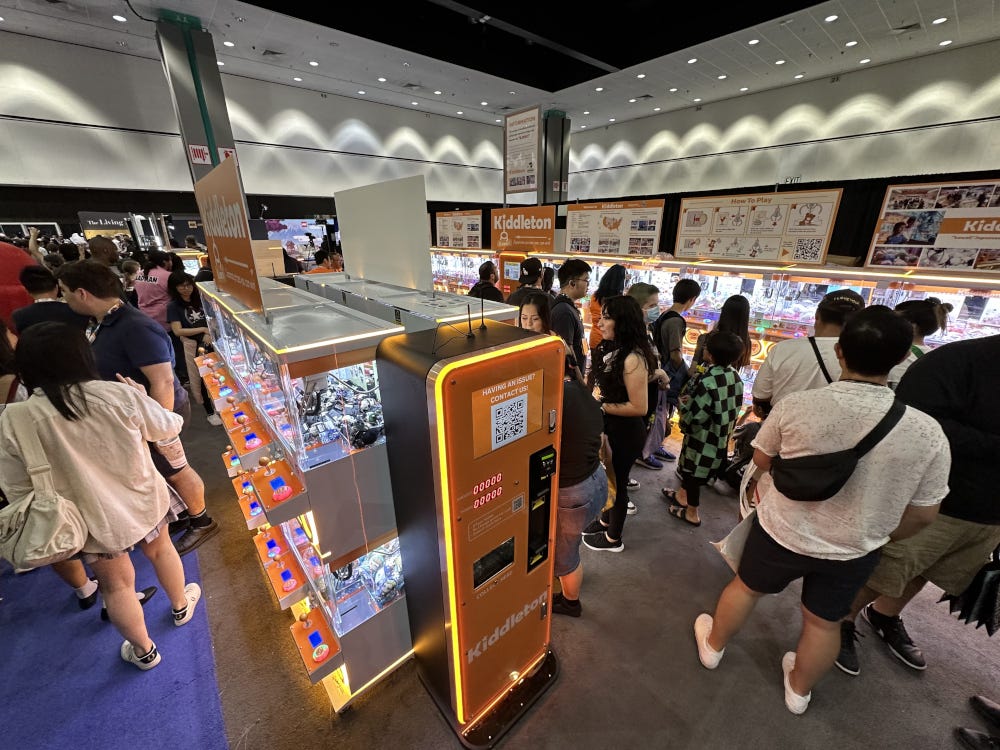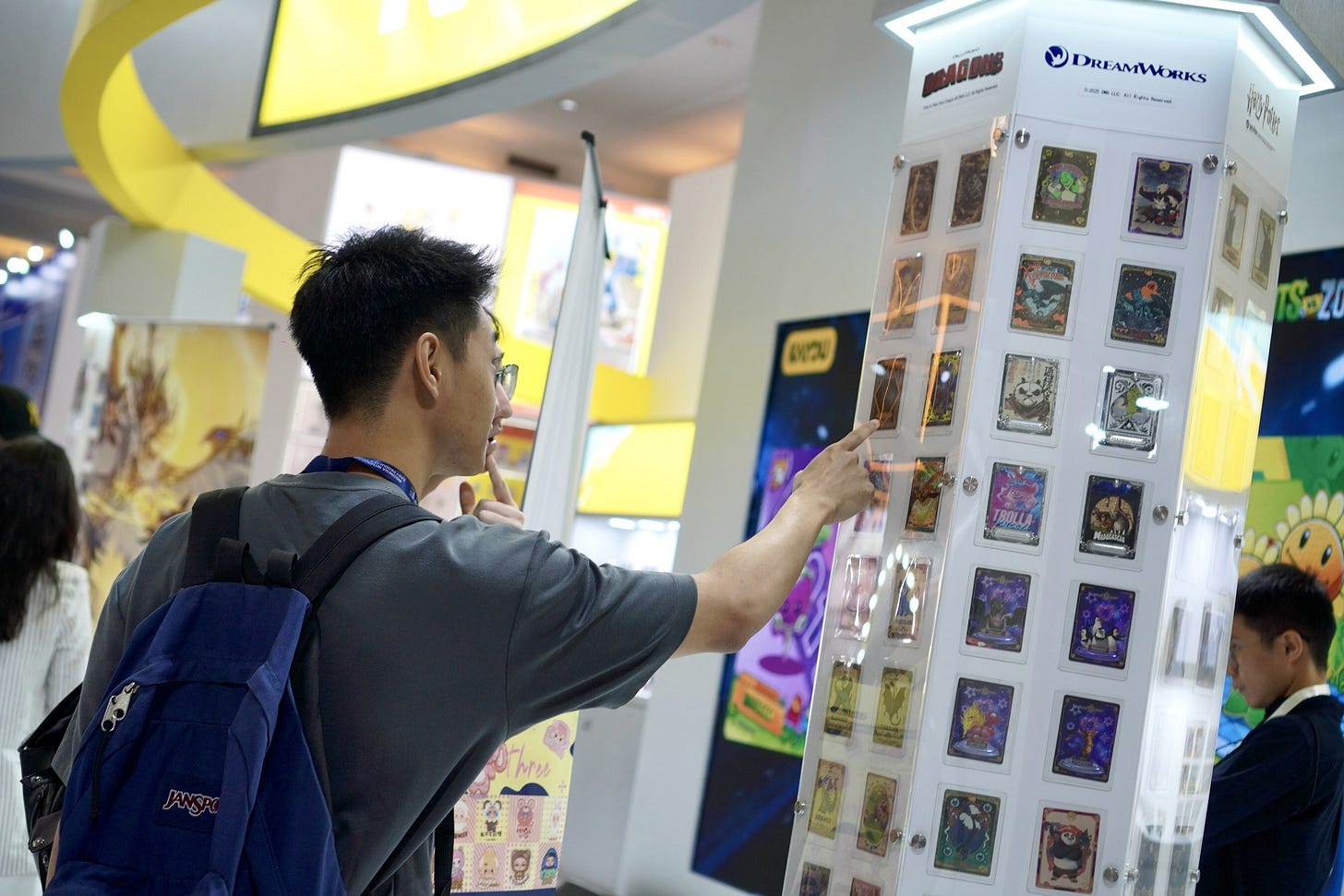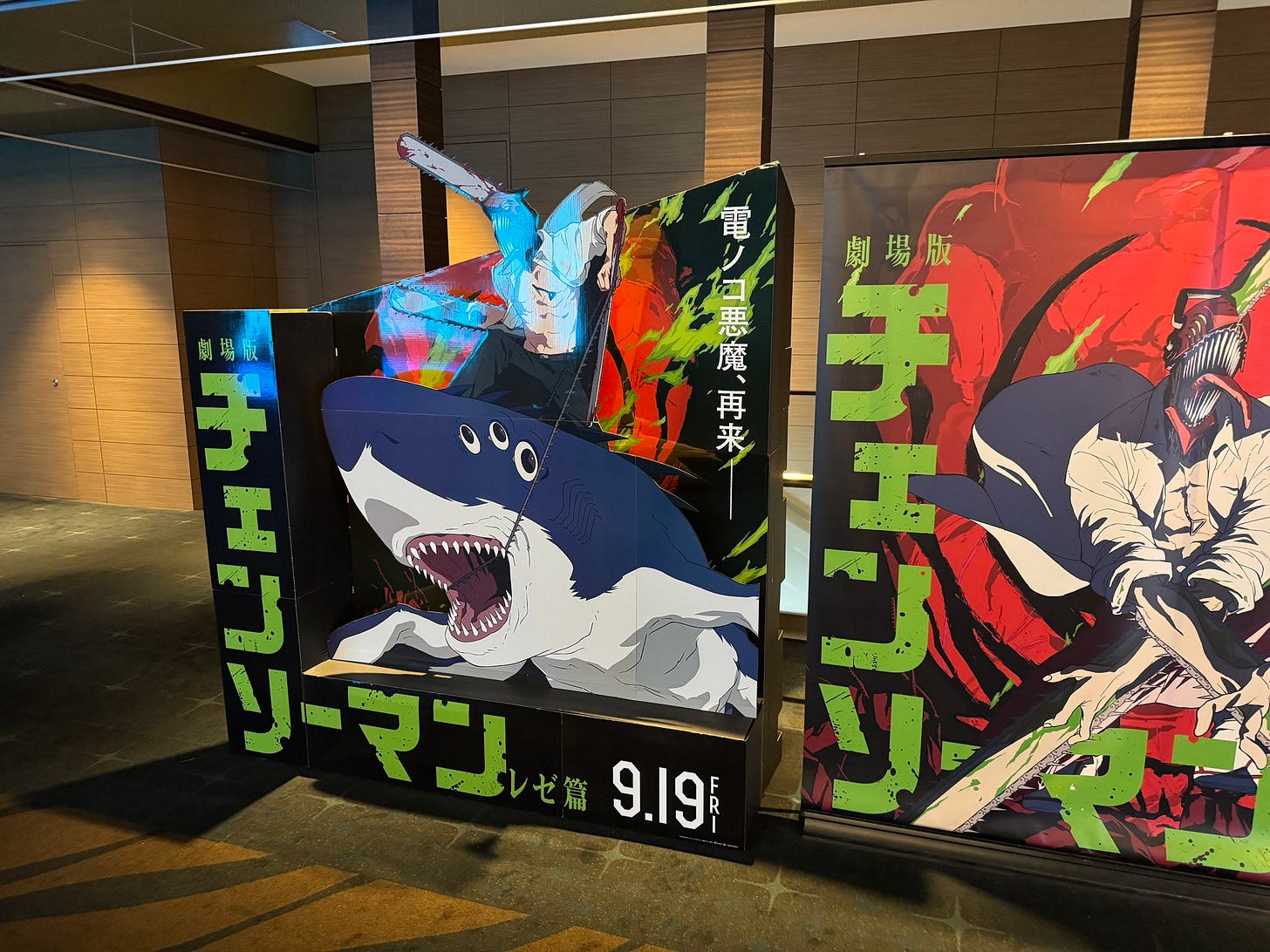Anime arcade machines sweep North America
Plus: Chinese trading card giant enters U.S. market; 'Chainsaw Man' tops Japan box office; Kodansha president explains Roblox partnership; and more
This is your weekly Animenomics briefing, covering the business of anime and manga. Today is Wednesday, September 24, 2025.
In case you missed it: Demon Slayer: Infinity Castle has become the highest-grossing anime film of all time globally and also the highest-grossing Japanese film of all time, surpassing US$555 million in box office earnings worldwide.
“Gen Z and Gen Alpha are a huge part of this [anime] fandom. But that doesn’t mean they’re the only age groups. We saw a lot of parents coming to see Infinity Castle with their kids, and there were many fans in their 30s, 40s, and 50s,” Crunchyroll president Rahul Purini told The Hollywood Reporter this week.
What we’re watching: On Infinity Castle’s potential for awards, Purini said, “We’ll do our part to make sure it gets the right level of support to be considered in all of the categories it could be eligible for.”
Genda consolidates North American arcade operations

Dallas, Tex.-based claw machine operator Kiddleton will become Genda Americas next year, consolidating Japanese amusement giant Genda’s gaming arcade operations in North America from 14 subsidiaries into three.
Why it matters: In taking control of its North American business, Genda is confident that local consumers will welcome more Japanese-style entertainment experiences like Kiddleton claw machines with anime-themed prizes.
Since the acquisition of Denver-based National Entertainment Network for ¥3.33 billion (US$22.5 million) last year, Genda has replaced arcade machines in more than 800 locations with Kiddleton’s.
By the numbers: Genda’s North American business is targeting ¥72.5 billion (US$490 million) in annual revenue by the fiscal year ending in January 2030, the company said in its half-year earnings presentation this month.
Genda and Kiddleton have made four acquisitions in North America in the last 12 months, adding about 160 amusement arcades and over 13,000 gaming corners with 30 or fewer machines installed.
Kiddleton recently Toronto-based Player One Amusement Group in July for ¥25.6 billion (US$173 million), according to figures disclosed in Genda’s latest securities report.
Backgrounder: Kiddleton was originally founded as a joint venture between Genda and Osaka-based bowling hall and amusement arcade operator Round One.
Genda took full ownership of Kiddleton in 2023 as the company emerged from the COVID-19 pandemic with a focus on entertainment experiences.
In the meantime, Round One is also in the midst of an expansion blitz in the U.S. as it seeks to double the number of arcade locations in the country by 2032.
The bigger picture: Genda has completed 26 acquisitions since it was founded in 2018, rapidly expanding in Japan’s domestic market by acquiring aging arcade centers like ones operated by Sega.
In 2024, it established Genda Europe in London with the goal of replicating the success of the North American business, but this time under the domestic GiGO brand.
Chinese trading card giant enters U.S. collectible market

Chinese trading card and collectible toy maker Kayou will launch its merchandise line in the United States ahead of the year-end holiday shopping season at next month’s New York Comic Con, the company announced last week.
Why it matters: Shanghai-based Kayou is China’s largest trading card company by gross merchandise value, and its entry into the United States signals confidence in the prospects of the country’s anime trading card market.
As previously reported by Animenomics, trading card makers in Japan are also experiencing a windfall from the global surge in demand for anime trading cards among players and collectors.
Catch up quick: Kayou holds a 71.1 percent share in China’s CN¥26.3 billion (US$3.7 billion) domestic market for trading cards, according to a pre-listing disclosure that the company submitted to the Hong Kong Stock Exchange in April.
The company’s trading card segment earned CN¥8.2 billion (US$1.2 billion) in net sales revenue in 2024, taking in CN¥5.8 billion (US$820 million) in gross profit at a 71 percent profit margin.
“Kayou’s products are being distributed in more than 10 countries worldwide, including Japan, Malaysia, and Indonesia,” a public relations representative for Kayou told Animenomics.
Kayou sought to raise up to US$500 million with a listing in Hong Kong last year but couldn’t receive approval from regulators in time amid reports by state media that Chinese youths were becoming addicted to trading cards.
What’s next: Kayou will debut at New York Comic Con its line of Naruto trading cards, under a Chinese sublicense that is active until 2027, and cards from My Little Pony and Tokidoki.
Kayou trading cards will be available at major U.S. retailers like Amazon, Barnes & Noble, GameStop, Target, and Walmart.
Go deeper: How Kayou is driving China’s trading card market
Clippings: ‘Chainsaw Man’ film opens at no. 1 in Japan
Chainsaw Man: Reze Arc opened at the top of the Japanese box office, earning more than ¥1.25 billion (US$8.46 million) and dethroning Demon Slayer: Infinity Castle after the latter spent nine weeks at number one in the box office charts. (Kogyo Tsushinsha)
Credit card spending in Japanese cinemas rose by 26.6 percent in August compared to the same month last year thanks to blockbuster films like Demon Slayer: Infinity Castle and Aniplex’s live-action hit Kokuho. (The Nikkei)
A solo developer has built Comix.fyi, a website that aggregates links to over 6,000 digital manga titles across 57 official Japanese platforms, allowing readers to navigate a crowded market of e-book and digital manga just to find a specific title. (Gigazine)
AI consortium Anime Chain, which seeks to create an “ethical” artificial intelligence model by training it using licensed data from anime copyright holders, is changing its name to Aniark to support broader digital transformation initiatives. (Press release)
Los Angeles city leaders approved a US$2.6 billion plan to expand the Los Angeles Convention Center, which for 18 years has been hosting Anime Expo, North America’s largest anime fan and industry event. (Los Angeles Times)
Yes, but: As previously reported by Animenomics, questions remain about Anime Expo’s future at the venue.
Warner Bros. Japan will end direct distribution of films produced by its Hollywood parent, licensing out the business to Toho subsidiary Towa Pictures. (Deadline)
Kodansha president sets context for Roblox partnership
“Until now, we have been granting official licenses to game developers and other game production companies. With Roblox, we will no longer directly supervise individual creators but will instead leave them to the terms maintained within Roblox. This approach is a new challenge that is different from what we’ve done before. Some creators may be resistant to this method, while others will be more willing to take an active role in it. In considering the interests of creators, we have decided that taking this approach is a better choice than doing nothing and allowing unauthorized uses to go unchecked. We hope that it will become clearer what is officially licensed and what is not.”
— Yoshinobu Noma, seventh generation Kodansha president
Context: Noma, who stood on the stage of the Roblox Developers Conference in July alongside Roblox chief executive David Baszucki, told Nikkei xTrend that he decided to participate in Roblox’s licensing platform in order to engage its more than 100 million daily players in their teens and 20s and to ensure that Kodansha can protect the IPs of its manga creators.
What we’re watching: After partnering with advertising giant Dentsu and Roblox developer support firm GeekOut to create manga based on Roblox games, Kodansha also expects to see anime adaptations of those games in the future.
Animenomics is an independently run and reader-supported publication. If you enjoyed this newsletter, consider sharing it with others.




I love that "Reze Arc" standee. So! Chainsaw Man has literally jumped the shark with this movie. Good to know. ;D